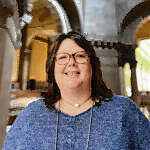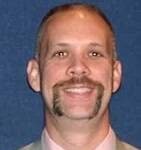The question, “Where is God,” is one that has been asked throughout the ages, usually when it involves some sort of tragedy.
The follow-up question often asked is more philosophical than the existential one I just mentioned: “If God is all loving and good, why is there evil in this world?”
These are questions that have entered my mind from time to time throughout this year.
The questions began in January as I thought my wife Michelle had cancer. She missed two months of work and the diagnosis that she had bone cancer seemed to be true.
However, in March she was back to normal and back to work, having no trace of cancer. My worries were over, or so I thought.
A few months later, I celebrated with Michelle and my daughter Faith by going to Disney World. This was something Michelle always wanted to do with Faith.
Then a month later to the day, I received an unexpected phone call from my mother-in-law telling me that my wife of 23 years had died. After Michelle pulled over to the side of the road, she became unconscious, with my 7-year-old daughter Faith in the back seat.
When Faith saw her mom unconscious, she climbed up to the front seat to try to wake her up, but to no avail.
I was left with the question of why. Not just why did Michelle die, but why did Faith have to have the last memory of her mom be that she died while sitting on her mom’s lap?
I had no answers. But what would happen just a few months later created even more questions.
It had been about five months after this tragic day when I was having lunch with friends at Harrison Country Club in Columbus before we were supposed to play a round of golf. Midway through the meal, I received a phone call from my youngest brother.
He began the conversation by stating, “I don’t know how to tell you this.” These were the same words that my mother-in-law used when she told me Michelle had died. A lump in my throat emerged immediately, as I braced myself for what was surely to follow.
With my eyes closed, I awaited the news I knew I didn’t want to hear. He told me that my brother Shannon had been killed by a drunk driver earlier that day. I didn’t even know how to process what I just heard.
Again, a senseless tragedy that didn’t have to happen.
I found out that the person Shannon would later take home after work had quit his job and he was working late for this young man. Shannon’s charitable nature motivated him to give the young man a ride to his home after he finished his shift.
Unfortunately, his normal route home was in the opposite direction. Had he gone his normal route, Shannon never would have been hit by that car.
It has been a few weeks since that fatal day as I struggle through the grieving and healing process. In thinking about how I should react, I felt that there were three ways I could respond to these tragedies.
First, there was the religious way. When I say religious way, I am not referring to religious practice in general. To the contrary, I am referring to the substitute Christian response that depersonalizes God and chooses to suppress the experience. After all, religious people have it all together and never struggle.
Second, I could have chosen the secular way. This way is rooted in the therapeutic. One simply talks his or her way through their emotions and processes them accordingly. No touch from God needed.
Instead, I chose what I will call the Christian way. Christianity teaches that God is personal and interacts with his people. He comforts and consoles them and touches them in their times of need.
Much of this interaction comes by way of interacting with God’s written word, the Bible.
It has been my experience that when tragedies like this happen, unbelief is waiting to destroy your faith in God.
To counter this, I have spent a lot of time standing on God’s promises and meditating on his character and nature that is revealed in Scripture. I have found that when I choose to stand on his word, in faith, the Holy Spirit does a work in my heart that is redemptive and strengthens me at the very core of my being.
Despite these tragedies, to quote a line from an old hymn, “all is well in my soul.”
Columbus’ Tim Orr is an adjunct faculty member in religious studies at IUPUC and author of the recently published book “We Named Her Faith: How We Became a Gospel-Centered Family.” He can be reached at [email protected].




